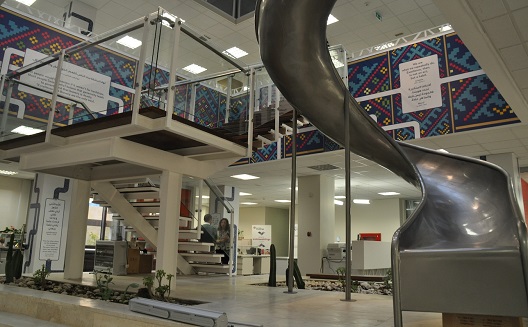Do you know the difference between an accelerator and an incubator?

Reine Farhat, Arabic Editor at Wamda, contributed to this article.

Accelerator Oasis 500's workplace
Terms like accelerators and incubators are no longer new to entrepreneurs, yet some might still have trouble differentiating between the two, and knowing which is the best option for growing their startups.
The difference between incubators and accelerators
Typically, both accelerators and incubators are organizations that help entrepreneurs turn their ideas into profitable projects, by offering mentorship, financial support, and access to mentors. So where is the difference exactly?
Both incubators and accelerators offer a program, funding, and working space, but sometimes in different ways:
- Program period: A typical mentorship at
an accelerator lasts between three to nine months; many are based
upon Y Combinator’s initial model. The duration of an incubator
program could reach five years.
- Funding: Accelerators often take around 8
to 10% of equity in exchange for anywhere from $15,000 USD to
$40,000 USD; incubators typically usually invest, but often do
match startups with potential investors.
- Working space: Both often provide offices for startups to work and meet experts and other entrepreneurs.
But which one is right for your startup?
The common assumption is that if you have already received investment and are looking for mentorship, or have a functioning startup and aren’t looking to give up equity, then you should choose an incubator. If, on the other hand, you’re closer to the idea stage, or you want to offer up equity to go through a “bootcamp,” and then raise investment, an accelerator might be best.

in5's offices
It gets tricky
The problem is that differentiating between incubators and accelerators is not always that easy. More and more organizations are opting for hybrid models, which, they believe, will be better suited to their audience. This is especially true in the MENA region where the startup scene is still young and need different support than in the more mature economies where those models were created.
Going through our list of incubators and accelerators in the region, you’ll notice that some incubators have accelerators features – Berytech can offer funding for equity – and some accelerators offer incubation-like features, like AUC, which lets the startups that have graduated from its acceleration program stay for an incubation follow-up program. So, don’t limit yourself to a label. Even if you’re looking for an acceleration program, don’t neglect the incubation programs; look at the programs more than the labels.
Also, think about what you’re looking for, regardless of the label. If you’re looking for funding and a place to work, look for a program that offers both; if what your startup needs is introduction to corporations or banks, look for a program that is known for its contacts book.
Investigate
Remember that not all incubators/accelerators are equal. Some incubators will have such a great mentoring program, and will put you in touch with so many people that in four months you'd have accelerated your startup far more than in a not-so-good accelerator.
In this context, it is very important to verify the reputation and experience of the team, and to check with alumni about their experiences. Keep in mind that just because an incubator or accelerator boasts famous alumni doesn’t mean their program is great.
Incubators and accelerators usually list their alumni on their website, and don’t be shy about contacting the alumni directly. Another solution can be to browse the internet for opinion articles or to ask on social media. (One thing we can say from hitting Facebook is that Turn8 alumni are not that satisfied with their experience.)


